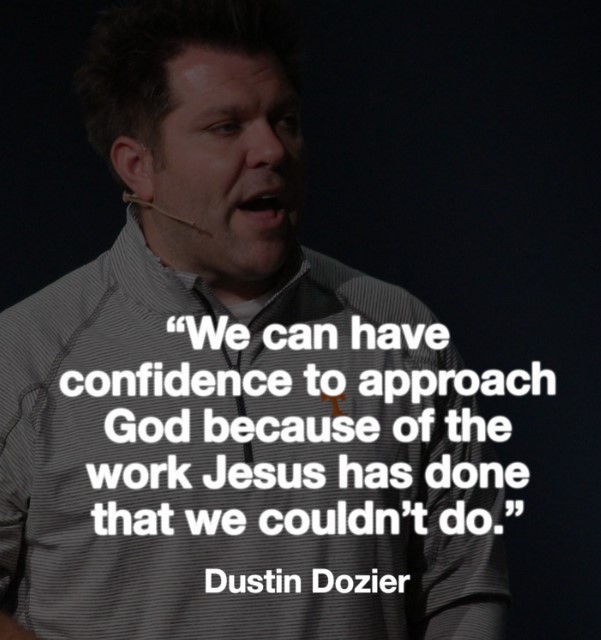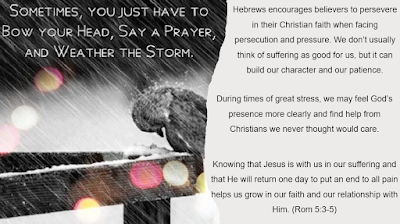Jesus is Better - Hebrews Week 11
What comparison in Hebrews has been most
helpful in your walk with Jesus?
(For example: Jesus being better than Moses, the better sacrifice, or the High Priests etc.)
What has God called you to
do in response to Jesus being better? How important is accountability in your
life? Do you have people who ask you tough questions and push you to truth in
love? How has accountability benefited you in your spiritual life?
The Point:
If we
really understand the gospel, it will impact the way we live every single day.
Hebrews
10:18-39
18 Where there is
forgiveness of these, there is no longer any offering for sin. 19 Therefore,
brothers, since we have confidence to enter the holy places by the blood of
Jesus, 20 by the new and living way that he opened for us through the curtain,
that is, through his flesh, 21 and since we have a great priest over the house
of God, 22 let us draw near with a true heart in full assurance of
faith, with our hearts sprinkled clean from an evil conscience and our bodies
washed with pure water. 23 Let us hold fast the confession of our hope without wavering, for he who
promised is faithful. 24 And let us consider how to stir up one another to love and good works, 25 not
neglecting to meet together, as is the habit of some, but encouraging one
another, and all the more as you see the Day drawing near. 26 For if we go on
sinning deliberately after receiving the knowledge of the truth, there no
longer remains a sacrifice for sins, 27 but a fearful expectation of judgment,
and a fury of fire that will consume the adversaries. 28 Anyone who has set
aside the law of Moses dies without mercy on the evidence of two or three
witnesses. 29 How much worse punishment, do you think, will be deserved by the
one who has trampled underfoot the Son of God, and has profaned the blood of
the covenant by which he was sanctified, and has outraged the Spirit of grace?
30 For we know him who said, “Vengeance is mine; I will repay.” And again, “The
Lord will judge his people.” 31 It is a fearful thing to fall into the hands of
the living God.
32 But recall the
former days when, after you were enlightened, you endured a hard struggle with
sufferings, 33 sometimes being publicly exposed to reproach and affliction, and
sometimes being partners with those so treated. 34 For you had compassion on
those in prison, and you joyfully accepted the plundering of your property,
since you knew that you yourselves had a better possession and an abiding one.
35 Therefore do not throw away your confidence, which has a great reward. 36
For you have need of endurance, so that when you have done the will of God you
may receive what is promised. 37 For, “Yet a little while, and the coming one
will come and will not delay; 38 but my righteous one shall live by faith, and
if he shrinks back, my soul has no pleasure in him.”
39 But we are not
of those who shrink back and are destroyed, but of those who have faith and
preserve their souls.
The Holy Bible: English Standard Version (Wheaton,
IL: Crossway Bibles, 2016), Heb 10:18-39.
Study Notes
WEEK 11 NOTES:
Hebrews 10:18-39
Please don’t miss
how pivotal this passage of Scripture is. The writer of Hebrews displays his
heart for these people. He knows a life following Jesus is better than anything
else. He desires these believers to understand and accept the truth that Jesus is
better. Having laid out his lessons, the writer now calls his audience to decide.
Truth from God’s Word always demands a response, because if we really
understand the gospel, it’ll impact the way we live our lives.
So, what’s the
writer of Hebrews calling us to do in response? He makes three appeals and then
explains why we should follow them. Each appeal begins with the phrase, “Let
us.” The writer wasn’t calling these believers to do something he wasn’t
willing to do himself. What’s the motivation for doing these three things? The
motivation, simply put, is found in verse 18. “Since there is forgiveness of
these, there is no longer any offering for sin.” In other words, the writer of
Hebrews is saying, “Since Jesus offers the absolute best sacrifice, a sacrifice
where your sin is paid for in full, hold onto the faith.” If we truly
understand the gospel and the power of Jesus’ sacrifice, we’ll respond in
obedience to the three “let us” statements. What are they and what do they mean
for us? “Let us draw near,” “Let us hold fast,” and “Let us stir up.”
Let us
draw near with a true heart in full assurance of faith.
The first command
the writer of Hebrews gives is to “draw near.” This reminds me of James 4,
where we’re promised if we draw near to God, He’ll draw near to us. If you
haven’t heard it enough by now, Jesus offers us access to God because He’s the
Great High Priest. Therefore, we’re able to draw near even when culture
encourages us to run back to our old way of life.
The writer of
Hebrews calls us to draw near with full assurance of faith. This doesn’t mean
we won’t experience doubts, instead, it shows we can have assurance in the
object of our faith. Jesus is trustworthy. You can trust Him with your soul,
forgiveness, the future, and with doubts. One of the best ways to prove you
believe Jesus is better is in the way you draw near instead of drifting away.
Let us hold fast the confession of our hope.
Another way to
apply the truth of Jesus being better is holding onto the confession of our
hope. The writer of Hebrews acknowledges suffering, and trials will take place
in this life. He knew these believers had previously faced difficulties. In
verses 33-36, he mentioned when these believers were converted, they
immediately were met with trials. Instead of wavering during their
difficulties, they decided to serve hurting people around them. Genuinely faith
transforms us on the inside and invites us to hold onto the confession of hope
we’ve made.
Let’s be clear in
our application. “Confession” also means testimony. First, we’re encouraged to
remember the moment we began following Jesus. We should hold onto who we were
before we met Jesus and how He met us with His amazing grace. Hold onto the testimony
of the transformation Jesus gave you. Essentially, the writer of Hebrews calls
us to hold tightly to the testimony of our hope (or faith) and not waver when
the going gets tough.
Let us
consider how to stir up one another to love and good works.
The final
application point revolves around our outward response to who Jesus is. He
says, “Let us consider how to stir up one another.” Accountability doesn’t
necessarily lead you into faith, but it certainly helps cultivate your faith.
He calls us to encourage others in love and good works. This only occurs as we
are inwardly renewed and transformed day by day. If we focus on negative
circumstances, it will be challenging to assist others in their walk with
Jesus.
How should we go
about stirring up other believers? First, we must consistently gather with the
saints. Verse 25 communicates the value of consistently going to church. This
is also applicable in gathering in a small group. Why is it important to stir
one another up? This is a way to encourage one another and hold one another
accountable with sin. The truth is we’ll never drift toward Jesus. Without
other believers stirring us up, we can quickly become careless and drift away
from the Lord.
QUESTIONS
FOR DISCUSSION
Based on what we’ve
learned from Hebrews, what should motivate us to draw near to God?
What were the three
“let us” statements?
Who is someone in
your life that has stirred you up?
How can you
practically stir up someone to love and good works?
Discuss your
conversion. How can reflecting on the moment Jesus saved you impact you each
day?
What is promised to
those who persevere?
END































No comments:
Post a Comment